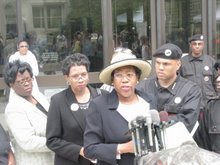No Drop Nonsense
A late twist in now-suspended District Attorney Mike Nifong's State Bar disciplinary hearing has people talking about whether Durham prosecutors are doing what the Bar's ethics guidelines require to shut down weak cases.
The talk started after one of Nifong's former assistant district attorneys, Kendra Montgomery-Blinn, testified that local prosecutors have a "no-drop" policy that calls for pushing ahead with at least some criminal cases, no matter how tough it might be to prove them, when they believe an alleged victim's claims and in an accused person's guilt.
The practice appears to be one of long standing.
Montgomery-Blinn's testimony is consistent with what other assistants have said to at least one lawyer in the area, and with what a former Durham district attorney, Ronald Stephens, told reporters during his time in office.
But State Bar ethics guidelines -- which on the point mirror the advice of the American Bar Association -- say district attorneys and their assistants must "refrain from prosecuting a charge that [they know] is not supported by probable cause."
And the state Supreme Court last year said satisfying the standard of proof in criminal cases requires more than just believing an alleged victim, even in rape cases.
The fallout of the Bar hearing has one resident, Sherri Rosenthal, arguing publicly that Nifong's successor has to re-evaluate the practices of the Durham district attorney's office.
"No one should be charged or indicted for a crime unless there is convincing evidence beyond a reasonable doubt of guilt," Rosenthal, an assistant city attorney, said in a posting last week to the Watts Hospital-Hillandale Neighborhood Association's e-mail list. "Where it is one person's word against another's, no charges should be brought unless there is convincing evidence that a crime was committed."
Rosenthal said in the e-mail that a Nifong assistant had told her the local practice amounts to "throwing cases in front of a jury."
She elaborated in an interview with The Herald-Sun, saying the comment was made regarding a case "that did not involve anything sexual but involved one person's word against another's."
Rosenthal said she was told "that they don't like to take sides, but like to put the evidence in front of a jury and let the jury decide credibility." She added that she disagrees with that view.
"I felt and feel that though that sounds superficially evenhanded, it is the job of the DA's office to weigh and decide whether there is clear and convincing evidence of guilt," she said. "Their office, in not wanting to be perceived as being unfavorable to certain complaining witnesses, abdicated their responsibilities when there are allegations of serious crime."
The point has come up in connection to the Duke lacrosse case, a prosecution state Attorney General Roy Cooper has said resulted from a "failure to verify serious allegations." Nifong sought indictments based solely on the word of the accuser, a 28-year-old exotic dancer, despite DNA findings that failed to corroborate her story.
Montgomery-Blinn's testimony to the Bar held echoes of comments Stephens -- now a Superior Court judge who handled some of the preliminary hearings in the lacrosse case -- made to reporters in 1992 when the then-district attorney in neighboring Orange County was under attack from activists who thought him soft on date-rape cases.
Stephens told one area newspaper that his policy on such cases was to pursue them if prosecutors believed the alleged victim.
"They're just tough cases, but that doesn't mean you back away from tough cases," he was quoted as saying. "We feel like there's an obligation there, and we'll go forward."
Stephens went on to say that his assistants often would use polygraph tests, despite their inadmissibility in court, to help gauge an accuser's credibility. Nifong and police didn't do that in the lacrosse case.
Montgomery-Blinn testified the Durham district attorney's office had a "no drop" policy, which usually pertained to domestic violence and sexual assault.
"We wouldn't dismiss a case," said Montgomery-Blinn, who is now the executive director of the N.C. Innocence Inquiry Commission. "... as long as we were convinced of the person's guilt."
“It is very troubling for anyone’s faith in the innocence commission when its director testified for a man who tried to put demonstrably innocent people in prison. It’s going to take a lot of work to give anyone any comfort that she can properly screen claims of innocence.”
Despite the assurances of Nifong apologist Montgomery-Blinn, a recent media report and statistics from the Adminstrative Office of the Court cast doubt on the existence of a "no drop" policy as described by the director of the Innocence Inquiry Commission. According to a March article by Brianne Dopart of the Herald-Sun, one hundred and two rapes were reported in Durham County last year, yet only one trial conviction was obtained.
Each year, Durham police and workers at Durham's Crisis Response Center handle scores of reported rapes.
In 2005, police took 61 rape reports. The Crisis Response Center helped 109 people who said they were victims of a recent rape or sexual assault. In 2006, police got 100 rape reports, and the Crisis Response Center provided services to 102 people.
Eleven were gang rapes, said Aurelia Sands Bell, the center's executive director.
The Herald-Sun asked the District Attorney's Office for a list of rape charges that resulted in convictions.
Candy Clarke, an assistant in the office, said there is no way to link the incident numbers the police assign to charges to the case numbers the DA's Office uses.
Clarke called it "a glitch" in the system.
Patrick Tamer of the state Administrative Office of the Courts in Raleigh said one person was convicted of rape in Durham in 2006.
Tracey Cline, who prosecutes the county's sex-crime cases, didn't return several phone calls seeking comment.
The AOC report for the fiscal year ending June 30, 2006, the only full statistcal year Nifong served as district attorney, indicates that in total, and contrary to the reported "no drop" policy, only two rape or first degree sexual offense charges were brought to trial. In fact, more than half (13 of 25) of all rape and sexual offense charges were dismissed during that same period and only 4% made it to trial, according to the AOC report.
Regardless of Montgomery-Blinn's puzzling attempt to justify Nifong's hijacking of the Hoax by testifying to the existence of a "no drop" policy, a drop rate in excess of 50% and a less than 1% ratio of trial convictions to accusations tell a different story. The actual numbers show the prevailing office policy may have been more accurately stated as a "half dropped" policy or a "four in a hundred go to trial" policy.














































6 comments:
well at least Linwood is gone per WRAL
Wow! This just gets stinkier all the time.
One thing to keep in mind is that one person's testimony, standing alone, can be sufficient to convict if the jury determines that witness is credible. Therefore, the prosecutor may legitimately bring charges based on only that testimony if it is believed. The ethical obligation not to pursue the case arises when the surrounding evidence establishes that the single witness cannot reasonably be believed beyond a reasonable doubt.
WRAL is reporting that Linwood Wilson no longer works at the DA's office. Can someone call the DA's office and confirm this? If true....stop the Linwood Clock!!!
I'm not sure from the statistics presented if Durham has a high or low drop policy. It seems that it is the policy in NC to charge for multiple offenses for a single act. Thus Reade, Collin, and Dave were charged with Rape, Sexual Assault, and Kidnapping; with the Rape charge dropped in December.
Most cases, it is my understanding, are closed through plea-bargains where the the prosecutor may drop the most serious charge, say Rape, and take a guilty plea for a lesser charge.
Since the court reporting system does not apparently provide the statistics in a way that will allow one to understand the actual dynamics here, a manual evaluation of the cases, from the initial charge to the final disposal, is necessary to draw an conclusions as to the actual policy.
Thanks to Kendra for opening another can of worms. After LW, Gottlieb should be next to go followed by David Addison, Tracey Cline, and Patrick Baker.
Post a Comment